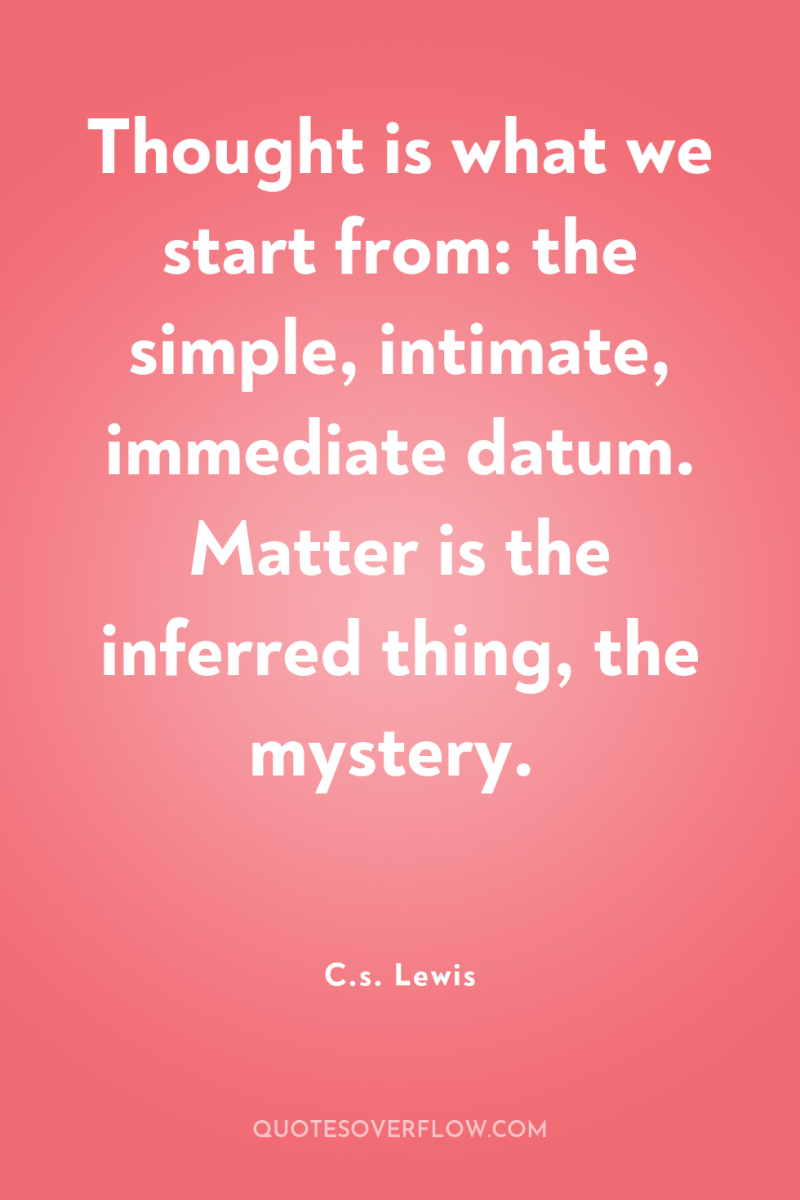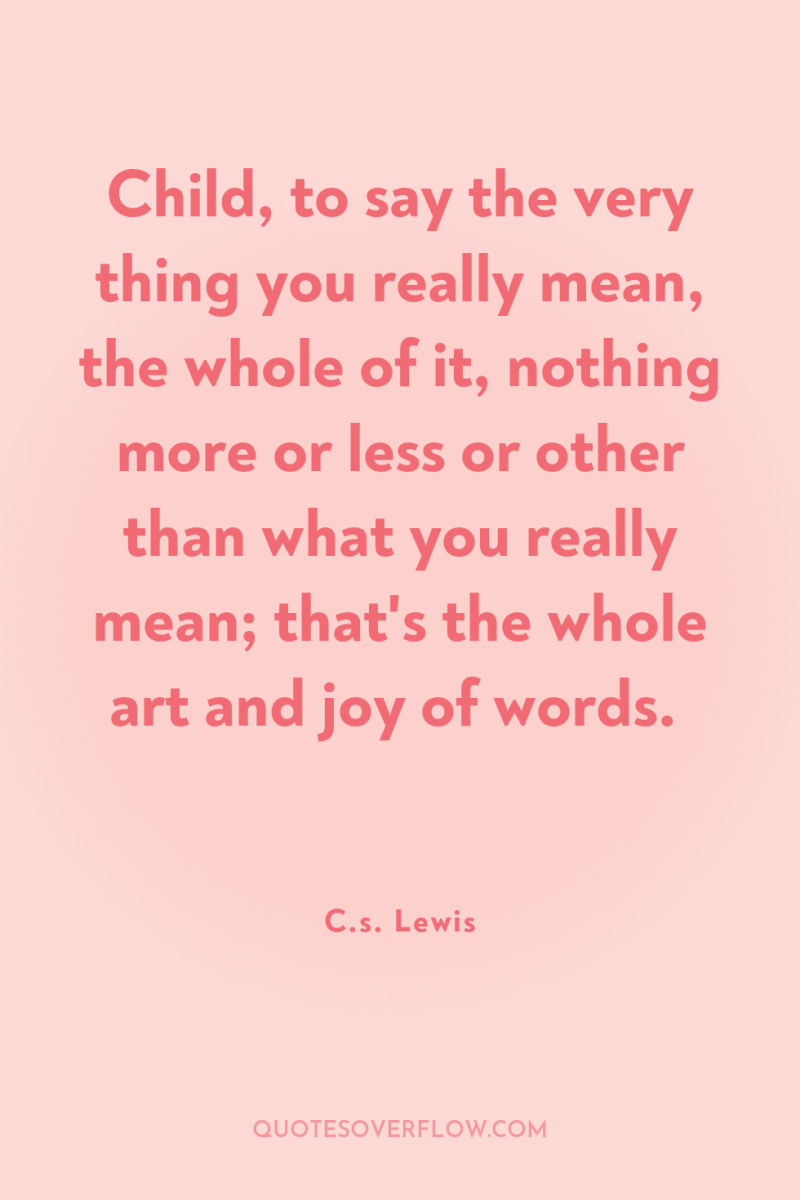1
And out of that hopeless attempt has come nearly all that we call human history–money, poverty, ambition, war, prostitution, classes, empires, slavery–the long terrible story of man trying to find something other than God which will make him happy.C.s. Lewis

2
Thought is what we start from: the simple, intimate, immediate datum. Matter is the inferred thing, the mystery.C.s. Lewis
3
Here I am going to say something which may come as a bit of a shock. God doesn't necessarily want us to be happy. He wants us to be lovable. Worthy of love. Able to be loved by Him. We don't start off being all that lovable, if we're honest. What makes people hard to love? Isn't it what is commonly called selfishness? Selfish people are hard to love because so little love comes out of them.William Nicholson

4
Self-sufficiency is the enemy of salvation. If you are self-sufficient, you have no need of God. If you have no need of God, you do not seek Him. If you do not seek Him, you will not find Him.William Nicholson
5
To put it another way, pain is God's megaphone to rouse a deaf world. Why must it be pain? Why can't he rouse us more gently, with violins or laughter? Because the dream from which we must be wakened, is the dream that all is well.William Nicholson

6
Child, to say the very thing you really mean, the whole of it, nothing more or less or other than what you really mean; that's the whole art and joy of words.C.s. Lewis

7
For every one pupil who needs to be guarded from a weak excess of sensibility there are three who need to be awakened from the slumber of cold vulgarityC.s. Lewis
8
My mother used to read to me every night when I was little. We got through most of the major fantasy books of that time. The Narnia books by C.S. Lewis were my favorites and, later, Tolkien's The Lord of the Rings. I started making dolls to fill in the gaps of the dolls I had. Obviously we couldn't buy centaurs and fauns and elves and fairies, so I made them to play with the normal dolls I had. I must have been about six years old when I started making fantasy dolls. .Wendy Froud
9
You would like to know how I behave when I am experiencing pain, not writing books about it. You need not guess, for I will tell you; I am a great coward.. If I knew any way of escape I would crawl through sewers to find it. But what is the good of telling you about my feelings? You know them already; they are the same as yours. I am not arguing that pain is not painful. Pain hurts. That is what the word means. I am only trying to show that the old Christian doctrine of being made 'perfect through suffering' is not incredible. To prove it palatable is beyond my design.C.s. Lewis
10
Some modern theologians have, quite rightly, protested against an excessively moralistic interpretation of Christianity. The Holiness of God is something more and other than moral perfection: His claim upon us is something more and other than the claims of moral duty. I do not deny it: But this conception, like that of corporate guilt, is very easily used as an evasion of the real issue. God may be more than moral goodness: He is not less. The road to the promised land runs past Sinai. The moral law may exist to be transcended, but there is no transcending it for those who have not first admitted its claims upon them, and then tried with all their strength to meet that claim, and fairly and squarely face the fact of their failure.C.s. Lewis
11
The first condition, then, of what is called a selfish love among men is lacking with God. He has no natural necessities, no passion, to compete with His wish for the beloved's welfare; or if there is in Him something which we have to imagine after the analogy of a passion, a want it is there by His own will and for our sakes. And the second condition is lacking too. The real interests of a child may differ from that which his father's affection instinctively demands, because the child is a separate being from the father with a nature which has its own needs and does not exist solely for the father nor find its whole perfection in being loved by him and which the father does not fully understand. But creatures are not thus separate from their Creator, nor can He misunderstand them. The place for which He designs them in His scheme of things is the place they are made for. When they reach it their nature is fulfilled and their happiness attained: a broken bone in the universe has been set, the anguish is over. When we want to be something other than the thing God wants us to be, we must be wanting what, in fact, will not make us happy. Those Divine demands which sound to our natural ears most like those of a despot and least like those of a lover, in fact marshal us where we should want to go, if we knew what we wanted. He demands our worship, our obedience, our prostration. .C.s. Lewis
12
The problem of reconciling human suffering with the existence of a God who loves is only insoluble so long as we attach a trivial meaning to the word 'love', and look on things as a man were the centre of them. Man is not the centre. God does not exist for the sake of man. Man does not exist for his own sake. 'Thou hast created all things, and for they pleasure they are and were created.' (Rev. 4:11) We were made not primarily that we may love God (though we were made for that too) but that God may love us, that we may become objects in which the Divine love may rest 'well pleased.' To ask that God's love should be content with us as we are is to ask that God should cease to be God:. .What we would here and now call our 'happiness' is not the end God chiefly has in view: but when we are such as He can love without impediment, we shall, in fact, be happy.C.s. Lewis
13
[But] we inherit a whole system of desires which do not necessarily contribute God's will but which, after centuries of usurped autonomy steadfastly ignore it. If the thing we like doing is, in fact, the thing God wants us to do, yet that is not our reason for doing it; it remains a mere happy coincidence. We cannot therefore know that we are acting at all, or primarily, for God's sake, unless the material of the action is contrary to our inclination or (in other words) painful and what we cannot know that we are choosing, we cannot choose. The full acting out of the self's surrender to God therefore demands pain: this action, to be perfect, must be done from the pure will to obey in the absence, or in the teeth, of inclination. How impossible it is to enact the surrender of the self by doing what we like..C.s. Lewis
14
... the possibility of pain is inherent in the very existence of a world where souls can meet.C.s. Lewis
15
Do we suppose that they can do Him any good or fear, like the chorus in MIlton, that human irreverence can bring about. His glory's diminution? A man can no more diminish God's glory be refusing to worship Him than a lunatic can put out the sun by scribbling the word darkness on the walls of his cell. But God wills our good and our good is to love Him (with that responsive love proper to creatives) and to love Hi we must know Him: and if we know Him, we shall in fact fall on our faces. If we do not, that only shows that what we are trying to love is nearest approximation to God which our thought and fantasy can attain. Yet the call is not only to prostration and awe; it is to a reflection of the Divine live, a creaturely participation in the Divine attributes which is far beyond our present desires. We are bidden to put on Christ, to become like God. That is, whether we like it or not, God intends to give us what we need not what we now think we want. Once more, we are embarrassed by the intolerable compliment, by too much love, not too little.C.s. Lewis
16
Yet perhaps even this view falls short of the truth. It is not simply that God has arbitrarily made us such that He is our only good. Rather, God is the only good of all creatures: and by necessity each must find its good in that kind and degree of the fruition of God which is proper to its nature. The kind and degree may vary with the creature's nature: but that there ever could be any other good is an atheistic dream.. George Macdonald.. represents God as saying to men, 'You must be strong with my strength and blessed with my blessedness for I have no other to give you.' That is the whole conclusion of the matter. God gives what He has, not what He has not: He gives the happiness that there is, not the happiness that is not. To be God - to be like God and to share His goodness in creaturely response - to be miserable - these are the only three alternatives. If we will not learn to eat the only food that the universe grows - the only food that any possible universe can ever grow - then we must starve eternally.C.s. Lewis
17
If pain sometimes shatters the creature's false self sufficiency, yet in supreme Trial or Sacrifice' it teaches him the self-sufficiency which really ought to be his - the 'strength which, if Heaven gave it may be called his own': for then, in the absence of all merely natural motives and supports he acts in that strength, and that alone, which God confers upon him through his subjected will. Human will becomes truly creative and truly our own when it is wholly God's, and this is one of the many senses in which he that loses his soul shall find it. In all other acts our will is fed through nature, that is, through created things other than the self - through the desires which our physical organism and our heredity supply to us. When we act from ourselves alone, that is, from God in ourselves - we are collaborators in, or live instruments of creation: and that is why such an act undoes with 'backward mutters of deserving power' the uncreative spell which Adam laid upon his species. .C.s. Lewis
18
There is a paradox about tribulation in Christianity. Blessed are the poor, but by judgement (i.e., social justice) and alms we are to remove poverty wherever possible. Blessed are we when persecuted, but we may avoid persecution by flying city to city, and may pray to be spared it as. Our Lord prayed in Gethsemane. But if suffering is good, ought it not to be pursued rather than avoided? I answer that suffering is not good in itself. What is good in any painful experience is for the sufferer, his submission to the will of God, and for the spectators, the compassion aroused and the acts of mercy to which it leads. In the fallen and partially redeemed universe, we may distinguish (1) the simple good descending from God, (2) the simple evil produced by rebellious creatures, and (3) the exploitation of that evil by God for His redemptive purpose, which produces (4) the complex good out of simple evil does not excuse - though by mercy it may save -- those who do simple evil. And this distinction is central. Offences must come, but woe to those whom they come; sins do cause grace to abound, but we must not make that excuse for continuing to sin. The crucifixion itself is the best, as well as the worst, of all historical events, but the role of Judas remains simply evil.. For you will certainly carry out God's purpose, however you act, but it makes a difference to you whether you serve like Judas or like John.C.s. Lewis
19
In great literature, I become a thousand different men but still remain myself.C.s. Lewis
20
Children have one kind of silliness, as you know, and grown-ups have another kind.C.s. Lewis
21
A concentrated mind and a sitting body make for better prayer than a kneeling body and a mind half asleep.C.s. Lewis
22
We are bidden to 'put on Christ', to become like God. That is, whether we like it or not, God intends to give us what we need, not what we now think we want. Once more, we are embarrassed by the intolerable compliment, by too much love, not too little.C.s. Lewis
23
It is not simply that God has arbitrarily made us such that He is our only good. Rather God is the only good of all creatures: and by necessity, each must find its good in that kind and degree of fruition of God which is proper to its nature. The kind and degree may vary with the creature's nature: but that there ever could be any other good, is an atheistic dream. George Macdonald, in a passage I cannot now find, represents God as saying to men, 'You must be strong with my strength and blessed with my blessedness, for I have no other to give you.' That is the conclusion of the whole matter. God gives what He has, not what He has not: He gives the happiness that there is, not the happiness that is not. To be God - to be like God and to share His goodness in creaturely response - to be miserable - these are the only three alternatives. If we will not learn to eat the only food that the universe grows - that only food that any possible universe ever can grow - then we must starve eternally. .C.s. Lewis
24
Grief is great. Only you and I in this land know that yet. Let us be good to one another.Unknown
25
In conversion, God interferes with out lives. We relinquish autonomy. If we find the gospel message to be true, we need to surrender to God and change our lives. For that reason - whether or not the trilemma or some form of it works - many will still never assent that Jesus is God.Gregory S. Cootsona
26
God creates us free, free to be selfish, but He adds a mechanism that will penetrate our selfishness and wake us up to the presence of others in this world, and that mechanism is called suffering.William Nicholson
27
When Christianity says that God loves man it means that God LOVES man: not that He has some 'disinterested'; because really indifferent, concern for our welfare, but that in awful and surprising truth, we are the objects of His love. You asked for a loving God: you have one. The great spirit you so lightly invoked, the 'lord of terrible aspect', is present: not a senile benevolence that drowsily wishes you to be happy in your own way, not the cold philanthropy of a conscientious magistrate, nor the care of a host who feels responsible for the comfort of his guests, but the consuming fire Himself, the Love that made the worlds... How this should be, I do not know: it passes reason to explain why any creatures, not to say creatures such as we should have a value so prodigious in their Creator's eyes. It is certainly a burden of glory, not only beyond our deserts but also, except in rare moments of grace, beyond our desiring; we are inclined, like the maidens in the old play, to deprecate the love of Zeus.C.s. Lewis
28
It is for people we care nothing about that we demand happiness on any terms: with our friends, our lovers, our children we are exacting and would rather see. them suffer much than be happy in contemptible and estranging modes. If God is Love, He is, by definition something more than mere kindness. And it appears, from all the records that though He has often rebuded us, condemned us, He has never regarded us with contempt. He has paid us the intolerable compliment of loving us, in the deepest, most tragic, most inexcusable sense.C.s. Lewis
29
(Of the main character seeing a new world for the first time.) The air was cold but not bitterly so, and it seemed a bit rough at the back of his throat. He gazed about him, and the very intensity of his desire to take in the new world at a glance defeated itself. He saw nothing but colours - colours that refused to form themselves into things. Moreover, he knew nothing yet well enough to see it: you cannot see things till you know roughly what they are. His first impression was of a bright, pale world - a watercolour world out of a child's paint-box, a moment later he recognised the flat belt of light blue as a sheet of water, or of something like water, which came nearly to his feet. They were on the shore of a lake or river.C.s. Lewis
30
Nobody can always have devout feelings: and even if we could, feelings are not what God principally cares about.C.s. Lewis
31
Feelings come and go, and when they come a good use can be made of them, but they cannot be our regular spiritual diet.C.s. Lewis
32
When we talk today about receptiveness to stories, we tend to contrast that attitude to one governed by reason - we talk about freeing ourselves from the shackles of the rational mind and that sort of thing - but no belief was more central to Lewis's mind than the belief that it is eminently, fully rational to be responsive to the enchanting power of stories.Alan Jacobs
33
I know, ” said Peter. “Perhaps better than anyone. But you can’t stay a child forever. To choose to speak into Echo’s Well is to choose illusion. To choose to avoid the responsibilities of being an adult. The real trick–the real choice–is to keep the best of the child you were, without forgetting when you grow up.“ It is the best of both worlds, Jack. Being a child is to believe in magic everywhere…“…but even Peter Pan had to grow up one day. .James A. Owen
34
In the same way a Christian is not a man who never goes wrong, but a man is enabled to repent and pick himself up and begin over again after each stumble--because the Christ-life is inside him, repairing him all the time, enabling him to repeat (in some degree) the kind of voluntary death which Christ Himself carried out." - Mere ChristianityC.s. Lewis
35
Of Course God does not consider you hopeless. If He did, He would not be moving you to seek Him (and He obviously is)... Continue seeking Him with seriousness. Unless He wanted you, you would not be wanting Him.C.s. Lewis
36
But, said Lewis, myths are lies, even though lies breathed through silver. No, said Tolkien, they are not..just as speech is invention about objects and ideas, so myth is invention about truth. We have come from God (continued Tolkien), and inevitably the myths woven by us, though they contain error, will also reflect a splintered fragment of the true light, the eternal truth that is with God. Indeed only by myth-making, only by becoming a 'sub-creator' and inventing stories, can Man aspire to the state of perfection that he knew before the Fall. Our myths may be misguided, but they steer however shakily towards the true harbour, while materialistic 'progress' leads only to a yawning abyss and the Iron Crown of the power of evil. You mean, asked Lewis, that the story of Christ is simply a true myth, a myth that works on us in the same way as the others, but a myth that really happened? In that case, he said, I begin to understand.Humphrey Carpenter
37
I think we delight to praise what we enjoy because the praise not merely expresses but completes the enjoyment; it is its appointed consummation. It is not out of compliment that lovers keep on telling one another how beautiful they are; the delight is incomplete till it is expressed. It is frustrating to have discovered a new author and not to be able to tell anyone how good he is; to come suddenly, at the turn of the road, upon some mountain valley of unexpected grandeur and then to have to keep silent because the people with you care for it no more than for a tin can in the ditch; to hear a good joke and find no one to share it with. The Scotch catechism says that man’s chief end is ‘to glorify God and enjoy Him forever.’ But we shall then know that these are the same thing. Fully to enjoy is to glorify. In commanding us to glorify Him, God is inviting us to enjoy Him. .C.s. Lewis